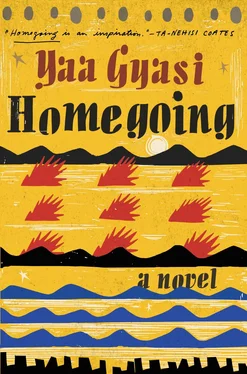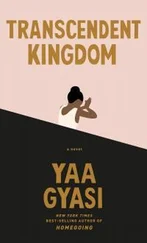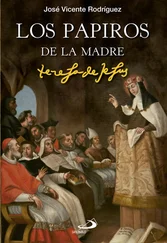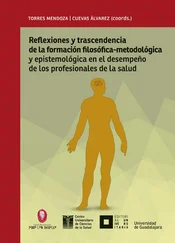—
Akua spent her days in the compound with her mother-in-law, Nana Serwah, and her children, Abee and Ama Serwah. She started each morning by sweeping, a task she had always enjoyed for its repetitiveness, its calm. It had been her job in the missionary school too, but there, the Missionary used to laugh as he watched her, marveling at the fact that the school floor was made of clay. “Who ever heard of sweeping dust from dust?” he would say, and Akua would wonder what the floors looked like where he came from.
After she swept, Akua would help the other women cook. Abee was only four years old, but she liked to hold the giant pestle and pretend that she was helping. “Mama, look!” she would say, hugging the tall stick to her tiny body. It towered above her, and the weight of it threatened to throw her off-balance. Akua’s toddler, Ama Serwah, had big, bright eyes that would glance from the top of the fufu stick to the trembling sister before sending her gaze to her mother.
“You are so strong!” Akua would say, and Nana Serwah would cluck her tongue.
“She’ll fall and hurt herself,” her mother-in-law would say, snatching the fufu stick from Abee’s hands and shaking her head. Akua knew that Nana Serwah did not approve of her, often saying that a woman whose mother had left her to be taught by white men would never know how to raise children herself. It was usually around this time that Nana Serwah would send Akua out to the market to pick up more ingredients for the food they would make later for Asamoah and the other men who spent their days outside, meeting, planning.
Akua liked walking to the market. She could finally think, without the scrutinizing gaze of the women and elderly men, who stayed around the compound, making fun of her for all the time she spent staring at the same spot on a hut’s wall. “She’s not correct,” they would say aloud, no doubt wondering why Asamoah would choose to marry her. But she wasn’t just staring into space; she was listening to all the sounds the world had to offer, to all the people who inhabited those spaces the others could not see. She was wandering.
On her walk to the market, she would often stop at the spot where the townsmen had burned the white man. A nameless man, a wanderer himself, who had found himself in the wrong town at the wrong time. At first he was safe, lying under a tree, shielding his face from the sun with a book, but then Kofi Poku, a child of only three, stumbled in front of Akua, who had been very close to asking the man if he was lost or needed help, pointed with his tiny index finger, and shouted, “Obroni!”
Akua’s ears prickled at the word. She had been in Kumasi the first time she heard it. A child who didn’t go to the missionary school had called the Missionary “obroni,” and the man turned as red as a burning sun and walked away. Akua was only six years old then. To her, the word had only ever meant “white man.” She hadn’t understood why the Missionary had gotten upset, and in times like those she wished she could remember her mother. Maybe she would have had the answers. Instead, Akua stole out that evening to the hut of a fetish priest on the edge of town who was said to have been around since the white man first came to the Gold Coast.
“Think about it,” the man said, after she told him what happened. In the missionary school they called white people Teacher or Reverend or Miss. When Abena died, Akua had been left to be raised by the Missionary. He was the only one who would take her. “It did not begin as obroni. It began as two words. Abro ni. ”
“Wicked man?” Akua said.
The fetish man nodded. “Among the Akan he is wicked man, the one who harms. Among the Ewe of the Southeast his name is Cunning Dog, the one who feigns niceness and then bites you.”
“The Missionary is not wicked,” Akua said.
The fetish man kept nuts in his pocket. This was how Akua had first met him. After her mother died, she had been wailing for her in the street. She hadn’t yet understood loss. Crying was what she did every time her mother left her, to go to market, to go to sea. Wailing for the loss of her was commonplace, but this time it had lasted the entire morning, and her mother had not reappeared to shush her, hold her, kiss her face. The fetish man saw her crying that day and had given her a kola nut. Chewing it had pacified her, for a time.
Now he gave one to her again and said, “Why is the Missionary not wicked?”
“He is God’s man.”
“And God’s men are not wicked?” he asked.
Akua nodded.
“Am I wicked?” the fetish man asked, and Akua didn’t know how to answer. That first day she had met him, when he had given her the kola nut, the Missionary had come out and seen her with him. He had snatched her hand and pulled her away and told her not to talk to fetish men. They called him a fetish man because he was, because he had not given up praying to the ancestors or dancing or collecting plants and rocks and bones and blood with which to make his fetish offerings. He had not been baptized. She knew he was supposed to be wicked, that she would be in a sea of trouble if the missionaries knew that she still went to see him, and yet she recognized that his kindness, his love, was different from the people’s at the school. Warmer and truer somehow.
“No, you’re not wicked,” she said.
“You can only decide a wicked man by what he does, Akua. The white man has earned his name here. Remember that.”
She did remember. She remembered it even as Kofi Poku pointed at the white man sleeping under the tree and shouted “Obroni!” She remembered as the crowd formed and as the rage that had been building in the village for months came to a head. The men awoke the white man by tying him to the tree. They built a fire, and then they burned him. All the while he was screaming in English, “Please, if anyone here can understand me, let me go! I am only a traveler. I am not from the government! I am not from the government!”
Akua was not the only person in the crowd who understood English. She was not the only person in the crowd who did nothing to help.
—
When Akua returned to the compound, everyone was in an uproar. She could sense the chaos in the air that seemed to get thicker, heavier, with noise and fear, the smoke from sizzling food and the buzzing of flies. Nana Serwah was covered in a film of sweat, her wrinkled hands rolling fufu by the second to plate up for the large crowd of men who had come. The woman looked up and spotted Akua.
“Akua, what’s wrong with you? Why are you just standing there? Come and help. These men need to be fed before the next meeting.”
Akua shook herself out of the daze she had been in and sat beside her mother-in-law, rolling the mashed cassava into neat little circles and passing them along to the next woman, who filled the bowls with soup.
The men were shouting loudly, so loudly that it was nearly impossible to distinguish what one was saying from what the others were saying. The sound of it was all the same. Outrage. Rage. Akua could see her husband, but she did not dare look at him. She knew her place was with her mother-in-law, the other women, the old men, not begging questions of him with her eyes.
“What is going on?” Akua whispered to Nana Serwah. The woman was rinsing her hands in the calabash of water that sat beside her, then drying them on her wrapper.
She spoke in a hushed tone, her lips barely moving. “The British governor, Frederick Hodgson, was in Kumasi today. He says they will not return King Prempeh I from exile.”
Akua sucked her teeth. This was what they had all been fearing.
“It’s worse than that,” her mother-in-law continued. “He said we must give him the Golden Stool so that he can sit on it or give it as a gift to his queen.”
Читать дальше

![Ally Carter - [Gallagher Girls 01] I'd Tell You I Love You But Then I'd Have to Kill You](/books/262179/ally-carter-gallagher-girls-01-i-d-tell-you-i-lo-thumb.webp)










